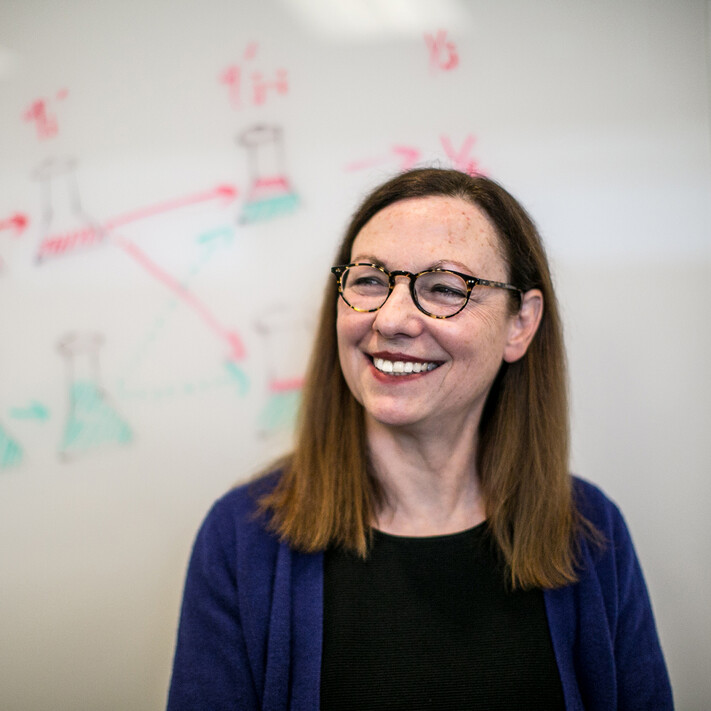Shelley L. Berger
Shelley L. Berger is the Daniel S. Och University Professor, Professor of Cell and Developmental Biology, and Professor of Biology. She is also founding Director of the Penn Epigenetics Program. With appointments in the Perelman School of Medicine and the School of Arts & Sciences, Berger works at the intersection of genetics, epigenetics, genomics, computational biology, and cell and developmental biology.
Epigenetics + Biology

Charting new frontiers for the emerging science of epigenetics, Shelley Berger studies mechanisms linked to aging, neurodegenerative disease, cancer and fertility. As founder of the Penn Epigenetics Program, Berger is a catalyst for uncovering new unifying biological regulatory themes as she leads research across Penn’s schools of arts and sciences, engineering, medicine and veterinary science, attracting participation by six regional hospitals, research institutes and universities.
Berger studies yeast and ants, tissues from healthy and diseased brains, mouse and human sperm in a quest for basic science breakthroughs and new therapeutic possibilities. Her research focuses on complex on-off switches on DNA’s packaging material that control how cells form genetically identical yet diverse tissues in an organism, and how those switches respond to environmental factors such as diet, exercise and stress to create heritable traits without changing the underlying genetic code.
Her publications in Science, Cell, Molecular Cell and Genes and Development have shaped the epigenetics research agenda. Notably, Berger’s 2009 Nature paper identified a single molecular epigenetic reaction that regulates lifespan, using yeast as a model organism for similar pathways in humans. In a 2014 Cell Metabolism paper, she identified a new epigenetic molecular circuit that controls longevity. Berger was elected to the American Academy of Arts and Sciences and the Institute of Medicine, and is a fellow of the American Association for the Advancement of Science. Her new undergraduate course, “Epigenetics of Human Health and Disease,” offers an overview of epigenetic science and discusses the development pipeline at biopharmaceutical and academic labs for new therapeutics targeting epigenetic mechanisms to combat human disease.
Next up on Berger’s research agenda: exploring epigenetics as a tool for developing personalized new therapies for cancer, understanding links between post-concussive syndrome and other neurodegenerative diseases, and identifying contributing factors and possible therapeutics for male infertility.
- Epigenetic regulation in a variety of model systems
- Chromatin mechanisms underlying aging
- Gametogenesis
- Viral infection
- Cancer
- Animal behavior
To explore Dr. Berger's work, visit the Berger Lab.
Academic Writings (Selected)
Simola DF, Graham R, Brady C, Enzmann B, Desplan C, Anandasankar R, Zwiebel L, Bonasio R, Reinberg D, Liebig J, Berger SL. (2016) Epigenetic (re)programming of caste-specific behavior in the ant Camponotus floridanus. Science, 351.
Capell BC, Drake AM, Zhu J, Shah PP, Dou Z, Dorsey J, Simola DF, Donahue G, Sammons M, Rai TS, Natale C, Ridky TW, Adams PD, and Berger SL. (2016) MLL1 is essential for the senescence-associated secretory phenotype. Genes & Development, 30: 321-6.
Simola DF, Graham RJ, Brady CM, Enzmann BL, Desplan C, Ray A, Zweibel LJ, Bonasio R, Reinberg D, Liebig J, and Berger SL. (2015) Epigenetic (re)programming of caste-specific behavior in the ant Camponotus floridanus. Science, 351:aac6633.
Dou Z, Xu C, Donahue G, Shimi T, Pan J, Zhu J, Ivanov A, Capell B, Drake A, Shah P, Catanzaro J, Ricketts MD, Lamark T, Adam SA, Marmorstein R, Zong WX, Johansen T, Goldman R, Adams P, Berger SL. Autophagy mediates degradation of nuclear lamina. Nature, 527: 105–109. (2015)
Zhu J, Sammons MA, Donahue G, Dou Z, Vedadi M, Getlik M, Barsyte-Lovejoy D, Al-Awar R, Katona BW, Shilatifard A, Huang J Hua X, Arrowsmith CH, and Berger SL. (2015) Prevalent p53 gain-of-function mutants co-opt epigenetic pathways to drive cancer growth. Nature, 525:206-11.
Bungard D, Fuerth BJ, Zeng PY, Faubert B, Viollet B, Mass N, Carling D, Thompson CB, Jones RG and Berger SL. (2010) Signaling kinase AMPK activates stress-promoted transcription via histone H2B phosphorylation. Science, 329: 1201-5.
Huang J, Perez-Burgos L, Placek BJ, Sengupta R, Richter M, Dorsey JA, Kubicek S, Opravil S, Jenuwein T, and Berger SL. Repression of p53 activity by Smyd2-mediated methylation. Nature, 444:629-32. (2006)
See the full list of Dr. Berger's publications here.
Interviews & Features (Selected)
"Penn researchers uncover epigenetic drivers for Alzheimer’s disease," Penn Today, September 28, 2020
"Straight Shooter," HHMI Bulletin, Winter 2014
"Shelley L Berger Elected to the American Academy of Arts and Sciences," Penn Arts & Sciences, April 20, 2013
"Six Teams Take on New Challenges with HHMI Collaborative Innovation Awards," HHMI News, September 6, 2012
"Epigenetics: Above and Beyond DNA," Penn Medicine News, Spring 2012
"Nancy Bonini and Shelley Berger are Elected to the Institute of Medicine," Penn Arts & Sciences, October 17, 2012
"Shelley L. Berger Is Appointed Penn Integrates Knowledge Professor,"Penn Current, June 16, 2009
"What Can Ants Teach Us About Aging and Behavior?" HHMI News, November 20, 2008
Videos (Selected)
"Epigenetic Regulation of Senescence and Aging," National Institutes of Health (NIH) Wednesday Afternoon Lecture, March 2014
"The Ant Queen and Epigenetics: A Conversation with Shelley Berger," The Science Network, September 2009
Daniel S. Och
“Faculty are at the heart of a great University. It's exciting to consider what will be possible at Penn through these professors."
- Daniel Och
Daniel Och, W'82 and his wife, Jane, created the Daniel S. Och University Professorship in 2006. Daniel Och is a member of the University of Pennsylvania Board of Trustees and the Wharton Undergraduate Executive Board.
Professor
Shelley L. Berger was named the Daniel S. Och University Professor in June 2009.
Education
- Ph.D., University of Michigan (cell + molecular biology)
- B.S., University of Michigan
University Service
- Penn Epigenetics Program, director
- Penn Institute for Regenerative Medicine, member
Professional Positions & Affiliations
- Institute of Medicine, elected member
- Molecular and Cellular Biology, senior editor
- American Association for the Advancement of Sciences, elected fellow
- American Academy of Arts and Sciences, elected member
Additional Penn Profiles
Contact
Perelman School of Medicine
9-125 Smilow Center for Translational Research
Philadelphia, PA 19104
215.746.3106 (o)
bergers@mail.med.upenn.edu